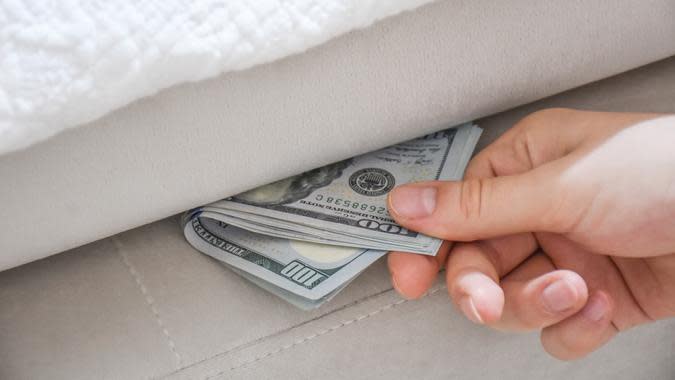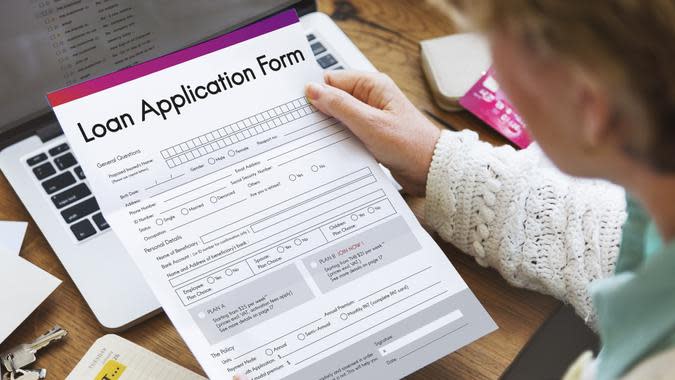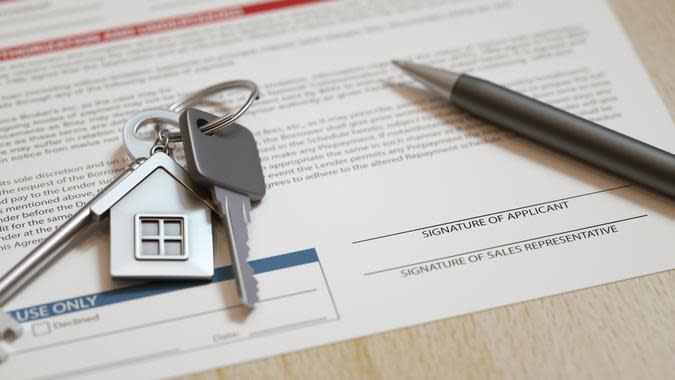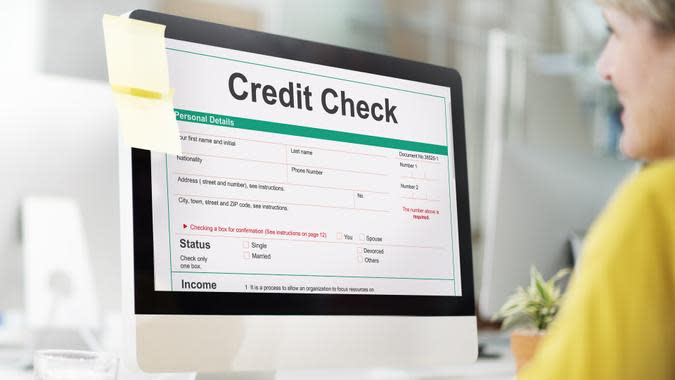19 Reasons Your Mortgage Loan Could Get Rejected

If you're buying a home, you're also probably applying for a mortgage. A mortgage loan application can feel like an IRS audit: tons of paperwork, a thousand questions, a loan officer who can make an IRS auditor look trusting and -- of course -- more paperwork.
Adjustable-Rate vs. Fixed-Rate Mortgage: How They Can Impact Your Finances
Credit Scores, Mortgages and Bills, Oh My! 5 Things To Know Before Buying a House
Unfortunately, even when you think you've done everything right, your mortgage could still get rejected for surprising reasons. GOBankingRates asked mortgage lending experts to run down some of these reasons, so you can find out how to avoid them.
Read more about unlikely but real reasons your home loan could get rejected.
Last updated: Oct. 11, 2021

You Changed Jobs Too Frequently
Lenders like stability -- and nothing screams "unstable" more than treating jobs like fashion trends. You'll need to stick around for at least two years, according to John Thomas, a branch manager at Primary Residential Mortgage.
"The guideline to get a mortgage loan is a minimum two-year work history as it provides stability in the eyes of the lender," Thomas said. "We as the bank want to make sure the borrower has the ability and the stability to keep paying the mortgage payment every month, and a job history is one of the best predictors. You don't have to be at the same job for two years, but there must be a pattern of continuing to work and stability."
More: 10 Common Mortgage Mistakes That Hurt Your Finances

You Didn’t Establish Credit
If you have established credit by being added as an authorized user to someone else's credit card, and have no seasoned, open credit of your own, you might get denied for a mortgage loan. "The underwriter will determine that the credit report is not an accurate reflection of your credit," Thomas said. "If that happens, your alternative is to qualify for a manually underwritten home loan."
You would have to provide alternate sources of credit and your debt-to-income ratio allowed would be lower, according to Thomas, but it's always best to open credit in your own name as opposed to being an authorized user.
See: Why It’s Still Worth Refinancing Your Mortgage Now — Except in This Situation

You Paid Debt but Didn’t Erase It
Paying off old debt can actually lower your credit score. This happens if the collection updates to "paid" with a date of today on your credit report and the last active report dates on the collection are two years old, according to Thomas. "It's better to try to pay the collection and negotiate with the debt collection agency to have it removed versus updating the status," he said. "Speak with a credit expert or a lender to see what should and should not be paid."
Find: 6 Ways To Get a Mortgage Even If You Think You Aren’t Eligible

Your Home Doesn’t Appraise for the Buying Price
"The lender requires an appraisal on the home because the home is the collateral for the mortgage loan," Thomas said. "The home loan is based on a percentage of the appraised value. For example, if putting 20 percent down, the lender is lending you 80 percent of the purchase price or appraised value, whichever is lower. If the home appraises low, the lender is going to reduce the amount you can borrow."
You will have three options at this point, according to Thomas:
Bring the difference in purchase price and appraised value, which increases your down payment.
Negotiate with the seller to lower the purchase price to the appraised value.
Walk away if the first two options don't work.

You Have Unpaid Tax Liens or Judgments
You might have forgotten about that old tax lien or judgment, but it's still out there waiting to haunt your home loan application. "Having an unpaid tax lien or a judgment can cause your mortgage loan application to be rejected and can come up the week before settlement," Thomas said.
"Just because an old tax lien or judgment is no longer reporting on credit doesn't mean it went away," he said. "Lenders are required to have a title search done prior to closing, and the title search will find any unpaid federal or state tax liens -- as well as any unpaid judgments. If you don't have the funds to pay them, you will not be able to close on the loan because title won't be able to issue a clear title policy to your new home."

You Opened or Closed a Credit Card at the Wrong Time
Lenders are required to either monitor your credit for new inquiries or pull a new credit report the day before closing, according to Thomas. "Either way, we will know if you opened new credit and if there is a new inquiry, the home loan must be re-underwritten with the new liability and the new payment," Thomas said. "We must also obtain a new credit report with the liability. A new liability could lower your credit score and make you no longer qualify, or it could increase your debt-to-income ratio, also making you no longer qualified."
Closing credit cards can also cause problems. "When you apply for a home loan, you want your credit report to be as healthy as possible," said Ray Rodriguez, regional mortgages sales manager at TD Bank in the greater New York City area. "You may think closing a card will help your finances, but in reality, this will reduce your overall available credit, which could negatively impact your credit score. When applying for a mortgage loan, it's important to demonstrate a history of responsible credit and the ability to manage multiple accounts, so by keeping one or more cards open but refraining from using them, you will not affect your score."

You Retired Early
You've achieved a nice bit of success and have decided to retire early and buy that dream home. Despite your good financial standing and confidence that you can afford the mortgage payment, you might need a lot of cash to buy that home.
"Many people work very hard to save and retire early, but have little income," said Mark Ferguson, a real estate agent and investor who runs InvestFourMore. "Because they have little income, lenders will not want to give them a new loan."
Discover: The Cost To Own a 3-Bedroom Home in Every State

You Have Business Debt
You might think your business finances are separate from your personal finances, but according to Ferguson, that's not always the case. "If you have personally guaranteed any business loans using your own Social Security number, they will show up on your credit report and could cause your home loan application to be rejected."

You Recently Purchased or Leased a Car
"Taking out a loan to buy a car, or leasing a car, in the months before your home loan closes could be a deal-breaker," said Mindy Jensen, a real estate investor and community manager with BiggerPockets, a real estate social network and marketplace. "Having a car payment increases your monthly debt obligations, increases your debt-to-income ratio and could cause your loan officer to worry about your ability to make your mortgage payment."

You Don’t Use an Acceptable Source for Your Down Payment
Borrowing down payment money is traditionally frowned upon, as are any other methods that don't season the money for at least 60 days, according to Elysia Stobbe, a mortgage expert and author of "How to Get Approved for the Best Mortgage Without Sticking a Fork in Your Eye."
"It's not acceptable if your down payment or cash for the closing was under your mattress and not in the bank for 60 days," Stobbe said. Gifts are an acceptable source, so some people are turning to crowdsourcing options like GoFundMe accounts to help finance their home purchases. Unfortunately, this won't work according to Stobbe: "It isn't a gift, so you can't use this money to buy real estate. Money which is gifted has to be from a relative or close family member."
Also, credit cards aren't the best choice for home down payments, either -- with interest rates higher than most of the worst mortgage rates, it's best to keep the plastic in your wallet.

Your Condo Is Unwarrantable or There’s a Problem With the HOA
"Fannie Mae and Freddie Mac buy most of the loans made in the U.S. today and use FHA loan standards when it comes to whether a property is acceptable or not," said Casey Fleming, author of "The Loan Guide: How to Get the Best Possible Mortgage."
"They will not make loans on condominiums with impaired marketability," Fleming said. "If a homeowner's association is currently involved in a lawsuit, for instance, all units in that development are considered unwarrantable, and neither Fannie nor Freddie will buy the loan. Other lenders may still make the mortgage loan, but it will be a bit more expensive."
Other factors that would cause a lender to decline a housing loan can include situations in which:
One owner owned more than 10% of the units, which usually indicates that the developer has too much control over the board of directors.
More than 15% of the units are behind in their HOA dues, which could impact the HOA's financial stability.
More than 50% of the units are rented, which can suggest they are likely not well-maintained.

You Owe Child Support or Alimony
"Child support and alimony are mandatory monthly expenses, so they are treated the same as a car or credit card payment and are part of the debt-to-income ratio calculation," according to Fleming. Because all lenders have to work with a maximum debt-to-income ratio, this puts many borrowers over the top, and they can't qualify.
"Borrowers with extremely high income or no other debt may still qualify," Fleming said. "However, if your finances are borderline, the child support or alimony payments may knock you out of the running for a housing loan."

You Have Too Many Write-Offs
If you are self-employed, paid as a 1099 contractor or are paid on commissions and have employee-related business expenses -- what you think you earn and what the lender thinks you earn could be vastly different numbers when you apply for a home loan.
"You write off expenses aggressively to save on taxes, but the lender must use the net income from your tax returns after your business expenses have been deducted," Fleming said. "If your net income still qualifies for the loan, you're fine. If not, you may find yourself being a little less aggressive next year."

You Aren’t Borrowing Enough Money
Believe it or not, borrowing too little money can get your home loan application rejected, said Abby J. Shemesh, acquisitions director and managing partner with Amerinote Xchange, a firm that buys and manages mortgage notes.
"Most lenders have a minimum loan requirement of $50,000," Shemesh said. "In some cases, that minimum is $75,000 to $100,000. Lenders make money on interest, and the higher the loan amount, the higher the profit. When the risk outweighs the profit, most of the time, a borrower will see a declined loan application."
Find Out: States With the Highest Property Taxes

Home Loan Interest Rates Changed
Everyone looks for cheap mortgages, but the mortgage loan rates today might not be the mortgage rates of tomorrow. Mortgage interest rates are priced on a daily basis and are subject to change, according to Fawn Terwilliger, chief lending officer of Service Credit Union in Portsmouth, N.H. The interest rate on the day you apply is the same one used to determine if you qualify, and if the applicant chooses not to lock in that interest rate, they might be subject to a re-qualification on the underwriting of that mortgage loan application.
But there's a simple way around this, according to Terwilliger: "Depending on the situation, mortgage applicants should consider locking the interest rate at application."
"Most lenders will offer a float down option to lock at the current rate for a small fee if rates do drop," she said. "Locking the interest rate shifts the risk of higher interest rates to the lender and not to the applicant. Higher interest rates may mean a higher monthly mortgage payment, all things being equal, and could impact favorable consideration for approval."

You Weren’t Honest With Your Lender
"Don't try to leave anything out when it comes to providing your loan officer the required documents for home loan origination," said Ed Hoffman, president of Wholesale Capital Corporation, a mortgage company in Southern California. "When you're applying for a housing loan, you need to show your loan officer everything they ask for: your paystubs, your tax returns, your bank statement. Let them tell you what they need and don't need. If you leave anything out that we discover later on, that can cause your loan to fall through."

Your Tax Return Has Errors
You can get in big trouble with the IRS if you file misleading tax returns. "Some unscrupulous tax professionals go heavy on deductions and even fabricate deductions that aren't real," said Frederick O. Towles of the Towles Group.
"For example, the individual's filing status could be single on the return when in fact the person is married and then they apply for the housing loan with their spouse," he said. "Maybe the tax return says that the taxpayer has a business and this business actually does not exist. Any issues of this type could affect whether your loan is rejected or not."

Your Credit Changed After Your Initial Home Loan Qualification
You might think you're done once you've passed the initial credit inquiry, but according to Sarah Kohut, vice president of mortgage lending at Guaranteed Rate, there might be a second hurdle.
"Most borrowers don't know that -- in addition to the credit inquiry a mortgage lender uses to qualify borrowers -- lenders are also obligated to perform a soft credit check just before close to make sure nothing has changed," said Kohut. "New lines of credit or missed or late payments can be cause for a new hard credit inquiry. If the new information causes your FICO score to fall below the required score, your mortgage loan will be denied."

You Don’t Have Enough Savings or Assets
Some lenders will require borrowers to have three to six months of reserves to cover a mortgage payment, said Colin Nabity of LeverageRx, an online lending and insurance marketplace for medical professionals.
"This can include cash or other liquid assets including stocks and bonds," Nabity said. "It helps reduce the risk to the lender and ensure that the borrower has enough money to cover the mortgage payment in the event of a financial setback."
[rock-component slug="more-from-gobankingrates"]
This article originally appeared on GOBankingRates.com: 19 Reasons Your Mortgage Loan Could Get Rejected
